Amateur Hour! One of the details we’ve been dreading about changing out our totally rusted and questionably reliable anchor chain is how to splice the new chain to the existing nylon 3 strand rode. We use 150′ of 5/16 hi test chain spliced to 150′ of rode for a total of 300 feet. Cruising the Western Caribbean we rarely used all 150′ of chain anchoring mostly in 15′ or less of water. The first time, when we were totally newbies, we had West Marine splice the chain to rode – they price matched Defender where we found better chain prices at the time. Now we’re on our own and it’s Amateur Hour! Please keep that in mind as you read about how we did this!
To start, we have a wooden crate filled with old rusty chain, the new chain marked for depth and ready to attach to the nylon rode.
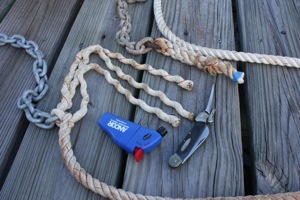
1. First things first, David assembles everything he thinks he’ll need including an awl, blue tape, the Ancor Mini Pocket Butane Torch, the sail kit needle and palm protector, a knife and some scissors.
2. Untwist the three strand nylon rode to twice the length that you want the splice. If you want, you can secure this spot with seizing line or blue tape to keep it from unraveling more. David didn’t have any trouble just starting from this point.
3.Blue taping the ends of each single strand and then melting each end with the Ancor Mini-Butane Torch. This will make it easier to feed the too large single strands through a too small space! 🙂
4. The next step is to start the connection by feeding the three ends through the connecting link of chain. Two should go through one way and one the other way.

5. Now take the awl or fid, whatever you’re using to “open” the spaces to feed the separated line through the nylon 3 strand line.
Thanks to AnimatedKnots.com for the great instructions we referenced when actually doing the splicing. The video shows an eye splice, but we figured we’re doing the same, just our “eye” is through the last link of chain! David did it in the US Coast Guard and thought he remembered how, but that was 40 years ago and he’s slept since then! The video is great to show what photos didn’t!
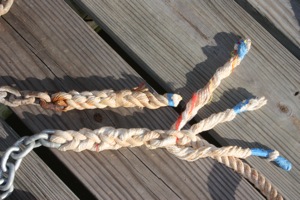
6. You’ll need to continue feeding each single strand through a bit at a time. Be sure to allocate adequate time for this project, it’s not a 10 minute job!
Note that we’re using the old splice as an example. In the video it says to use 4 repetitions, but this is our anchor chain connection and a very very critical splice so we imitated the original splice and actually repeated the repetitions six times.
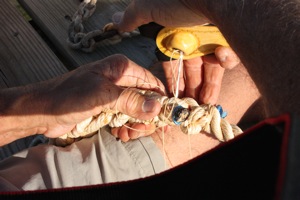
7. After the six repetitions are complete, it’s time to finish the splice by seizing the ends to keep them from unraveling. We used sail thread, a sail thread needle and palm to push the needle through. The original splice only had one seizing, at the end. But David opted to do three — one at the end, middle and beginning of the spice on the theory that if one is good, three has to be better! 🙂
8. Then finish by adding an extra revolution, a couple half hitches and then a knot or two for good measure. Cut any extra ends off and melt the ends with the butane torch.

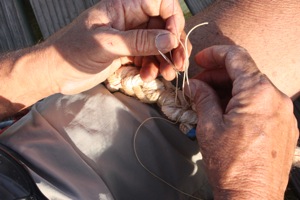

And now we wait for a longer than two day weather window to go anchor out and test the splice — YIKES! 🙂 I’m sure there are dozens of cruisers out there that do this better than we do. Please leave comments and let everyone know your tips! THX! J
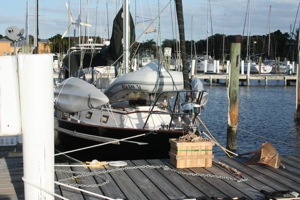

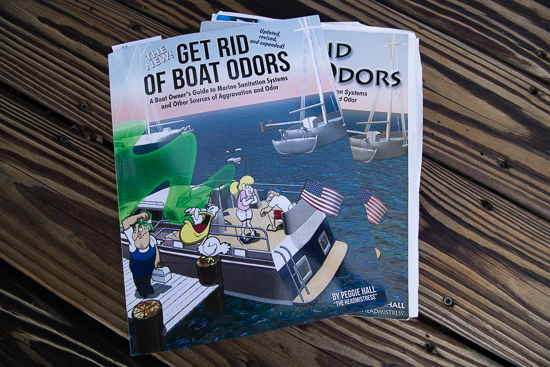
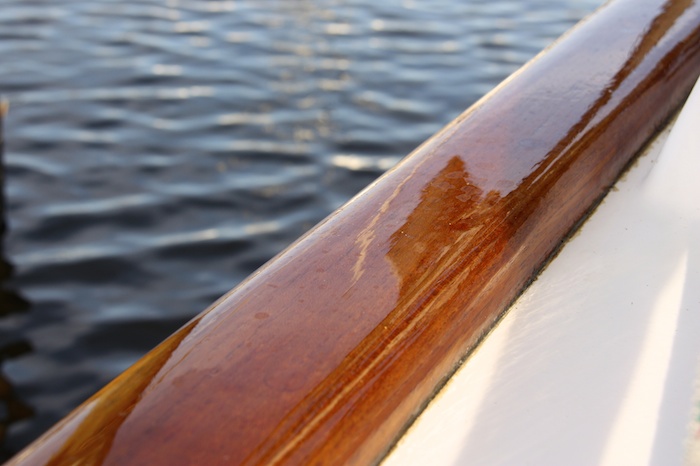







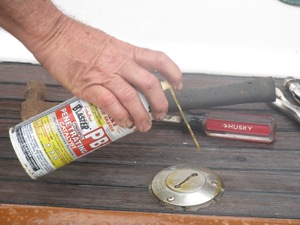


good description…